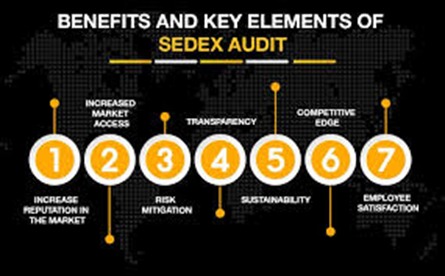SEDEX (Supplier Ethical Data Exchange) Approval
SEDEX (Supplier Ethical Data Exchange) approval, achieved through audits like SMETA (Sedex Members Ethical Trade Audit), demonstrates a company's commitment to ethical and responsible business practices within its supply chain, covering labor standards, health & safety, environment, and business ethics.
What is SEDEX?
- SEDEX is a non-profit organization providing tools and services to help businesses manage and improve their supply chain sustainability.
- It allows businesses to share data about their ethical and sustainable practices with customers and stakeholders.
- SEDEX itself doesn't set standards but offers a framework and tools for companies to enhance their ethical performance.

What is SMETA?
- SMETA (Sedex Members Ethical Trade Audit) is a globally recognized audit methodology.
- It assesses a company's ethical performance across four pillars: Labor Standards, Health & Safety, Environment, and Business Ethics.
- SMETA audits are conducted by Sedex-approved auditing companies, helping businesses identify and mitigate potential risks.
Benefits of SEDEX and SMETA Certification
- Demonstrates Ethical Commitment: Shows customers, investors, and stakeholders that your company prioritizes responsible business practices.
- Reduces Supply Chain Risks: Helps identify and address potential supply chain issues related to social responsibility and sustainability.
- Improves Supply Chain Management: Offers tools to manage supply chains more effectively, including sharing data with multiple customers at once.
- Builds Trust: Enhances trust with customers, investors, and stakeholders by promoting ethical and sustainable practices.
- Reduces Audit Duplication: SEDEX minimizes repetitive supply chain audits by offering a standardized approach.
How to Achieve SEDEX Approval
- Become a Sedex Member: Register and activate an account on the Sedex platform.
- Undergo an SMETA Audit: Choose a Sedex-approved auditing company to conduct the SMETA audit.
- Implement Corrective Action Plans: Develop and apply corrective actions to address any deficiencies found during the audit.
- Share Data on the Sedex Platform: Post your SMETA audit results on the Sedex platform to share them with customers and stakeholders.
